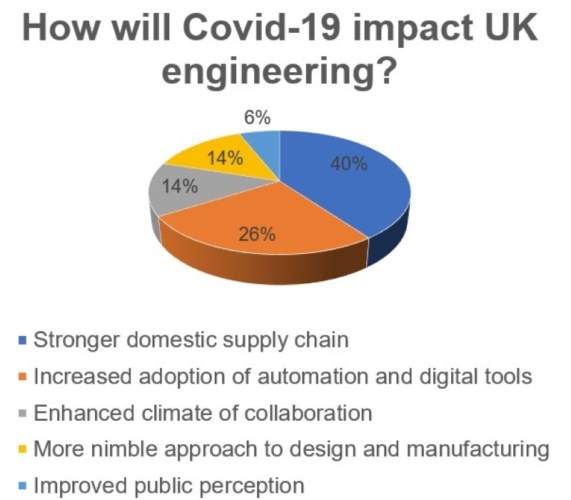
Once it does, the full extent of Covid-19’s impact on society and the economy will become clearer, but until that time manufacturers will continue collaborations aimed at equipping the NHS with equipment needed to treat patients.
One certainty is that Covid-19 has exposed the lack of supply chain resilience in a globalised economy, another, already noted, are the many pinch points and strengths of the UK’s different sectors.
But what long-term impact will this have on the manufacturing sector once Covid-19 is no longer the threat that it is today.
MORE ON THE ENGINEERING RESPONSE TO COVID-19 HERE
COMMENT: WHY COVID-19 COULD BE A CATALYST FOR CHANGE

For 40 per cent of respondents to last week’s poll, the UK will have a stronger domestic supply chain after Covid-19, followed by just over a quarter (26 per cent) who agree that there will be increased adoption of automation and digital tools.
Twenty-eight per cent of the vote was split equally between those who think there will be a more nimble approach to design and manufacturing, and an enhanced climate of collaboration.
Only six per cent of respondents thought the crisis would improve the public’s perception of engineering.
In the comments that followed, Andy Sandford said: “Hearing pretty amazing tales of companies getting things done in days that would have taken months. From what I have been seeing subcontractors and their suppliers have really stepped up to the mark.”
Darren Marson, Managing Director For Intec Laser Services added: “Perhaps the backroom support provided by the manufacturing sector in order to assist the hard working, brave and dedicated NHS staff will now go some way to shine a light on what we [engineers] have to offer. WWII was won by the factories of the UK, and so will Covid-19 be defeated in a similar way……let’s hope one of the changes evident on the other side of Covid is a new found respect for all those hard working, skilled engineering & manufacturing staff, and the companies they serve.”
“Covid 19 will prove a catalyst,” suggested Bill Church. “It will accelerate changes already happening on a number of fronts: bringing manufacturing back to the UK, increasing online business and shopping, home working, video conferencing and much more.”
“Let’s hope things do change, but as a cynic I cannot help but think things will return to their old ways when the dust settles,” said Another Steve. “We have an economic environment that is driven by the unsustainable belief that profits can keep on increasing, this has just resulted in lack of investment and poorer work conditions on the shop floor.”
What do you think? Let The Engineer know in Comments, but be aware that comments are moderated - you can read our guidelines here




Nanogenerator consumes CO2 to generate electricity
Nice to see my my views being backed up by no less a figure than Sabine Hossenfelder https://youtu.be/QoJzs4fA4fo